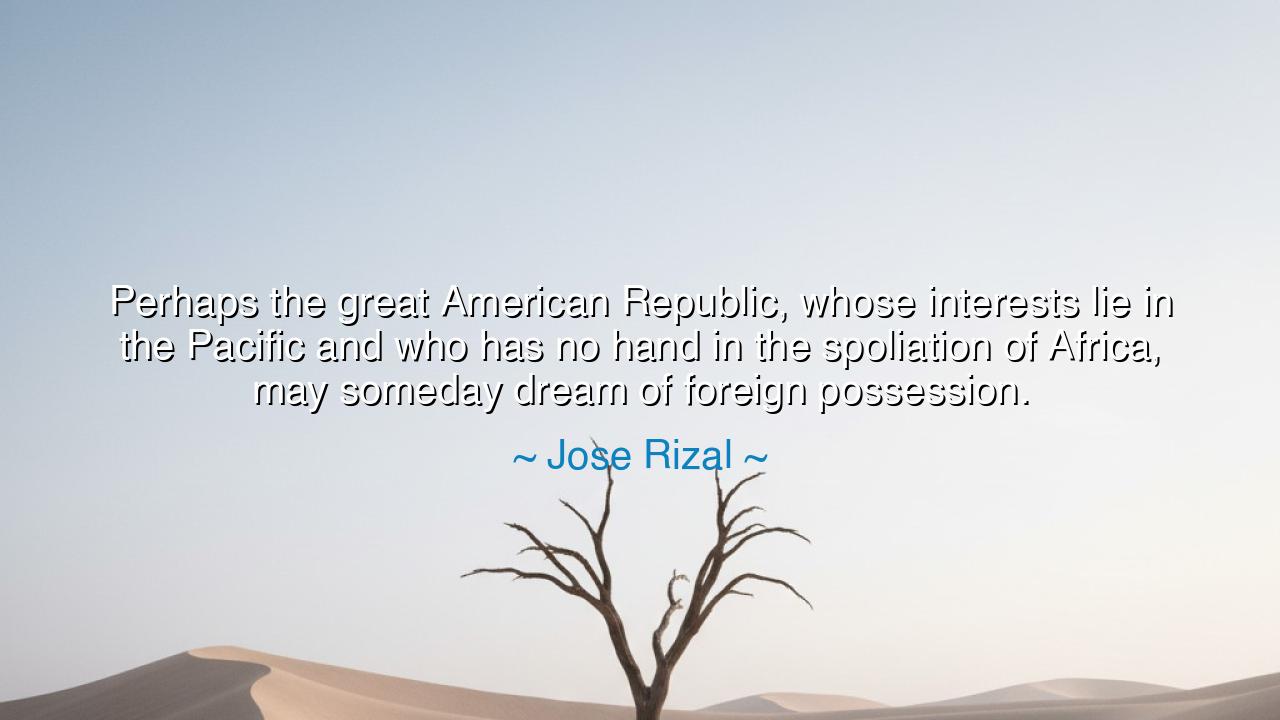
Perhaps the great American Republic, whose interests lie in the
Perhaps the great American Republic, whose interests lie in the Pacific and who has no hand in the spoliation of Africa, may someday dream of foreign possession.






“Perhaps the great American Republic, whose interests lie in the Pacific and who has no hand in the spoliation of Africa, may someday dream of foreign possession.” Thus wrote José Rizal, the visionary martyr of the Philippines, a prophet who saw the movements of empires long before their sails appeared upon his nation’s shores. His words, calm yet foreboding, carry the weight of history’s turning tide. Beneath their scholarly tone burns the fire of insight — for in this sentence, Rizal foresaw what the world would one day witness: the rise of American imperial ambition, and the arrival of a new power in the theater of global conquest. His was not only the voice of a patriot, but of a seer, who understood that even nations born of freedom can, in time, dream of empire.
To understand the depth of this prophecy, we must return to the late nineteenth century — an age when the world’s great powers carved the map of the Earth with steel and greed. Africa lay divided among Europe’s empires, its people enslaved to the hunger of conquest. Asia, too, was being partitioned — India under Britain’s crown, Indochina under France, the Dutch ruling the Indies, the Spaniards holding the Philippines. Only America, the young republic across the ocean, seemed untouched by this spoliation, this plundering of nations. Rizal, ever the observer of the human spirit and the cycles of history, gazed upon that distant republic with both admiration and caution. For though it had cast off its own colonial chains, he knew that power, once tasted, often breeds the same desire to rule others.
His words were written before the Spanish-American War, before the annexation of the Philippines, before the American flag rose over Manila in 1898 — yet they carry the weight of uncanny foresight. Rizal, who believed in education and enlightenment as the weapons of liberation, understood that nations are bound by the same passions as men. The republic that once cried for liberty might one day justify its domination in the name of “civilization” and “progress.” In this quote, his tone is not accusatory but contemplative, as though he speaks to the future, warning that even noble ideals can be twisted by ambition. The dream of liberty, if not guarded by conscience, can become the dream of possession.
Indeed, his warning came to pass. The United States, after defeating Spain, took possession of the Philippines — not as a liberator, but as a new master. Rizal was long dead by then, executed for his defense of freedom, yet his words rang in the ears of those who survived him. America, once the symbol of independence, had entered the age of empire, extending its reach across the Pacific, from Hawaii to Guam, from the Philippines to the far edges of Asia. The prophecy had been fulfilled — and the poet’s insight had become history’s reality.
Yet Rizal’s wisdom reaches beyond the American example. It speaks to all nations, all peoples, and all hearts that rise in power. For in his words lies a universal warning: that power without reflection becomes tyranny, that strength without humility becomes corruption. Every generation must guard itself against the intoxication of dominance. The republic that forgets its ideals becomes the empire it once overthrew; the liberator who forgets compassion becomes the oppressor he once despised. Rizal’s prophecy is, therefore, not merely political — it is moral, eternal, and deeply human.
History offers countless mirrors of this truth. Consider Rome, born from the ashes of monarchy, sworn to defend liberty through its republic — yet in time, it too became an empire, enslaving the very nations it once claimed to protect. Or Napoleon’s France, which rose from revolution’s cry for equality, only to conquer the continents it vowed to free. So it is with all who fail to heed the lesson Rizal left us: that liberty is not a possession to be owned, but a light to be shared — and that the moment a nation seeks to possess others, it begins to lose its own soul.
So, my friend, let this be your lesson: beware the whisper of ambition disguised as virtue. Whether in nations or in men, the thirst to dominate always begins with the illusion of righteousness. Rizal calls upon us — the heirs of his wisdom — to remain vigilant, to uphold justice not with conquest, but with compassion; not with dominion, but with understanding. For the true greatness of a people lies not in the lands it conquers, but in the freedom it defends, the dignity it grants to others, and the peace it sows in the hearts of all.
Thus, when José Rizal spoke of the great American Republic, he was not speaking only of a nation, but of the eternal cycle of power — a cycle that can only be broken by wisdom. His words remind us that every empire begins as an ideal and every ideal risks becoming an empire. To those who would lead, his message endures: hold fast to the spirit of freedom, lest your dream of liberty become the dream of foreign possession. And in remembering this, may we never forget that the truest measure of greatness is not the reach of one’s dominion, but the breadth of one’s humanity.






AAdministratorAdministrator
Welcome, honored guests. Please leave a comment, we will respond soon